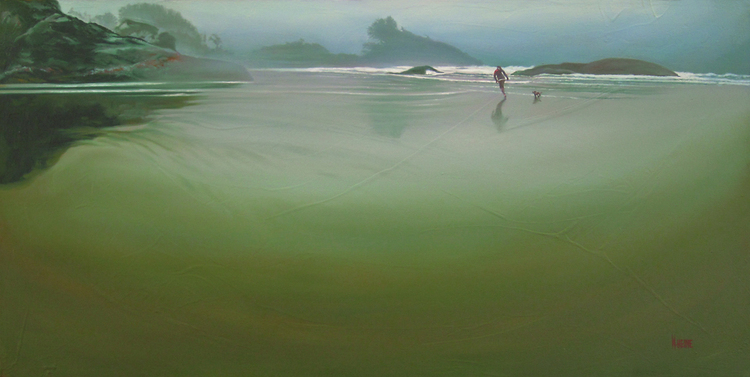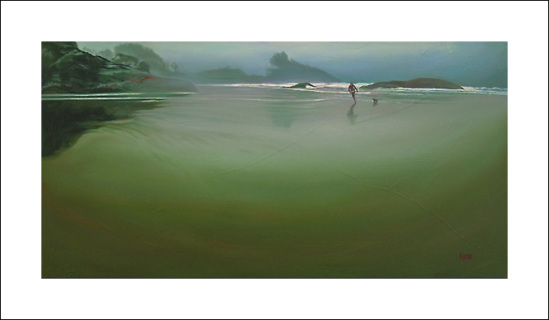Chesterman Ebb Tide... Limited Edition Print
Each hand-signed and numbered reproduction is printed using archival inks on the finest quality, heavyweight acid free paper.
Included with each print is a signed, embossed certificate of authenticity and the painting back label story.
This edition will be limited to a maximum of 400 prints. Framing is not included.
Included with each print is a signed, embossed certificate of authenticity and the painting back label story.
This edition will be limited to a maximum of 400 prints. Framing is not included.
Back Label writing...
This is Chesterman Beach, near Tofino, on the west coast of Vancouver Island, in Canada. The tide has ebbed low in this overcast morning, allowing a jogger and his enthusiastic new puppy a longer run than usual.
In the summer, the earth’s proximity to the moon brings very low tides such as this. In contrast, the winter is the time for the unusually high tides. The headland on the left normally juts out into the water and marks the south end of Chesterman. The bay beyond is usually only accessible if you care to clamber over the jagged rocks and sharp barnacles. A risky endeavour.
When I was young, I would come here with my family. It was our favourite camping location. In those days, visitors were allowed to drive on the hard-packed sand. The beaches then were decorated with rusting hulks belonging to those who, seeking seclusion, would drive around the headland to picnic, only to find themselves trapped by the incoming tide. That would be the end of that car. If you’re not familiar with the rhythm of the sea here, it can happen fast. The occasional hulk can still be found, but most are buried deep in the shifting sand.
On our first visit to Tofino, back in the 1960s, we came here to camp with several families. One day, we all walked out to a small island, like the one on the right side of this painting. We spent a few minutes watching the surf break on the exposed side. When we turned to leave, we were surprised to find that the tide had risen and we were all trapped by four feet of boiling, swirling cold water. The men were forced to jump in and pass the children, bucket-brigade–style, to the safety of the distant beach. I remember how funny we kids thought it was, but in another few minutes, we would all have been in much bigger trouble. Mark Heine
This is Chesterman Beach, near Tofino, on the west coast of Vancouver Island, in Canada. The tide has ebbed low in this overcast morning, allowing a jogger and his enthusiastic new puppy a longer run than usual.
In the summer, the earth’s proximity to the moon brings very low tides such as this. In contrast, the winter is the time for the unusually high tides. The headland on the left normally juts out into the water and marks the south end of Chesterman. The bay beyond is usually only accessible if you care to clamber over the jagged rocks and sharp barnacles. A risky endeavour.
When I was young, I would come here with my family. It was our favourite camping location. In those days, visitors were allowed to drive on the hard-packed sand. The beaches then were decorated with rusting hulks belonging to those who, seeking seclusion, would drive around the headland to picnic, only to find themselves trapped by the incoming tide. That would be the end of that car. If you’re not familiar with the rhythm of the sea here, it can happen fast. The occasional hulk can still be found, but most are buried deep in the shifting sand.
On our first visit to Tofino, back in the 1960s, we came here to camp with several families. One day, we all walked out to a small island, like the one on the right side of this painting. We spent a few minutes watching the surf break on the exposed side. When we turned to leave, we were surprised to find that the tide had risen and we were all trapped by four feet of boiling, swirling cold water. The men were forced to jump in and pass the children, bucket-brigade–style, to the safety of the distant beach. I remember how funny we kids thought it was, but in another few minutes, we would all have been in much bigger trouble. Mark Heine



